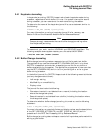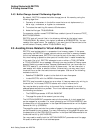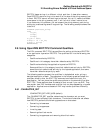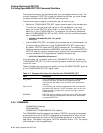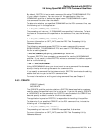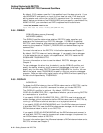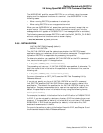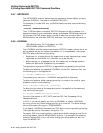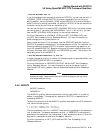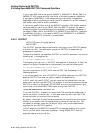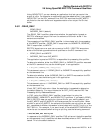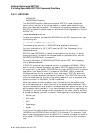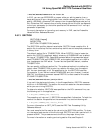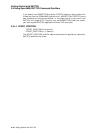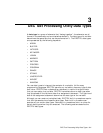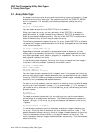
Getting Started with DECTPU
2.6 Using OpenVMS EDIT/TPU Command Qualifiers
$ EDIT/TPU/NOJOURNAL memo.txt
If you are developing an application layered on DECTPU, you can use the built-in
JOURNAL_OPEN to direct DECTPU to create a keystroke journal file for an
editing session. Using JOURNAL_OPEN causes DECTPU to provide a 500-byte
buffer in which to journal keystrokes. By default, DECTPU writes the contents of
the buffer to the journal file when the buffer is full.
You can use the built-in procedure SET (JOURNALING) to turn on buffer-change
journaling, even if you have used /NOJOURNAL to turn it off initially. You can
also use SET (JOURNALING) to adjust the journaling frequency.
For more information on JOURNAL_OPEN and SET (JOURNALING), see
the DEC Text Processing Utility Reference Manual. For more information on
buffer-change journaling, see Section 2.4.
Once a keystroke journal file is created, use the /RECOVER qualifier to direct
DECTPU to process the commands in the keystroke journal file. For example, the
following command causes DECTPU to recover a previous editing session on an
input file named MEMO.TXT. Because the journal file has a name different from
the input file name, both /JOURNAL and /RECOVER are used. The name of the
keystroke journal file is MEMO.TJL:
$ EDIT/TPU/RECOVER/JOURNAL=memo.tjl memo.txt
In buffer-change journaling, to recover the changes made to a specified buffer, use
the RECOVER_BUFFER built-in procedure.
For more information on RECOVER_BUFFER, see the DEC Text Processing
Utility Reference Manual. For more information on how to recover from an
interrupted EVE editing session, see the Extensible Versatile Editor Reference
Manual.
Note
Compaq strongly recommends the use of buffer-change journaling rather
than keystroke journaling.
2.6.9 /MODIFY
/MODIFY (default)
/NOMODIFY
The /MODIFY qualifier determines whether the first user buffer in an editing
session is modifiable. The application layered on DECTPU is responsible for
processing /MODIFY.
To determine what form of the /MODIFY qualifier was used on the DCL command
line, use the following calls:
x := GET_INFO (COMMAND_LINE, "modify");
x := GET_INFO (COMMAND_LINE, "nomodify");
The first statement returns 1 if /MODIFY was explicitly specified on the command
line, 0 otherwise. The second statement returns 1 if /NOMODIFY was explicitly
specified on the command line, 0 otherwise. If both statements return 0, then the
application is expected to determine the default behavior.
For more information on GET_INFO, see the DEC Text Processing Utility
Reference Manual.
Getting Started with DECTPU 2–15



